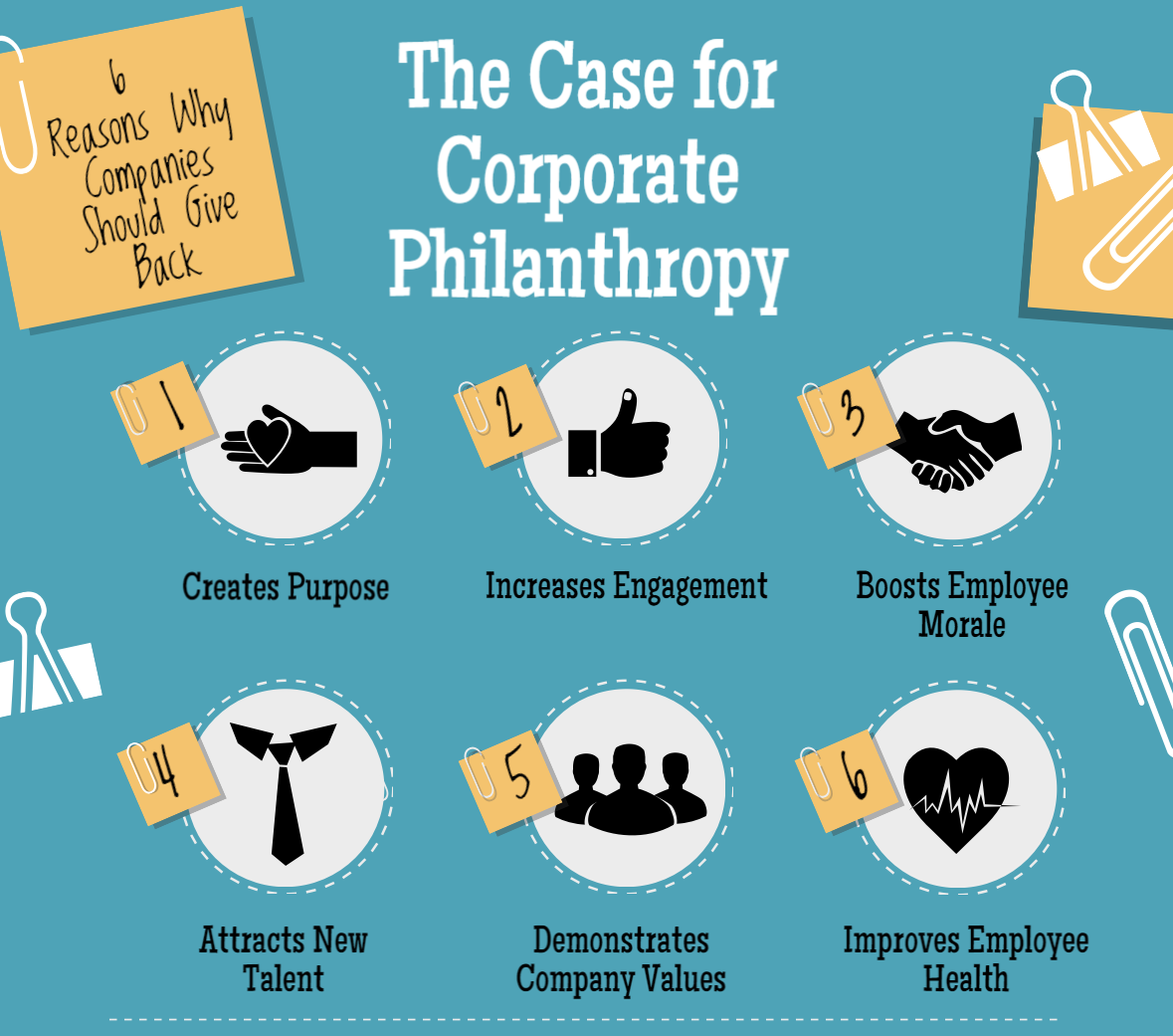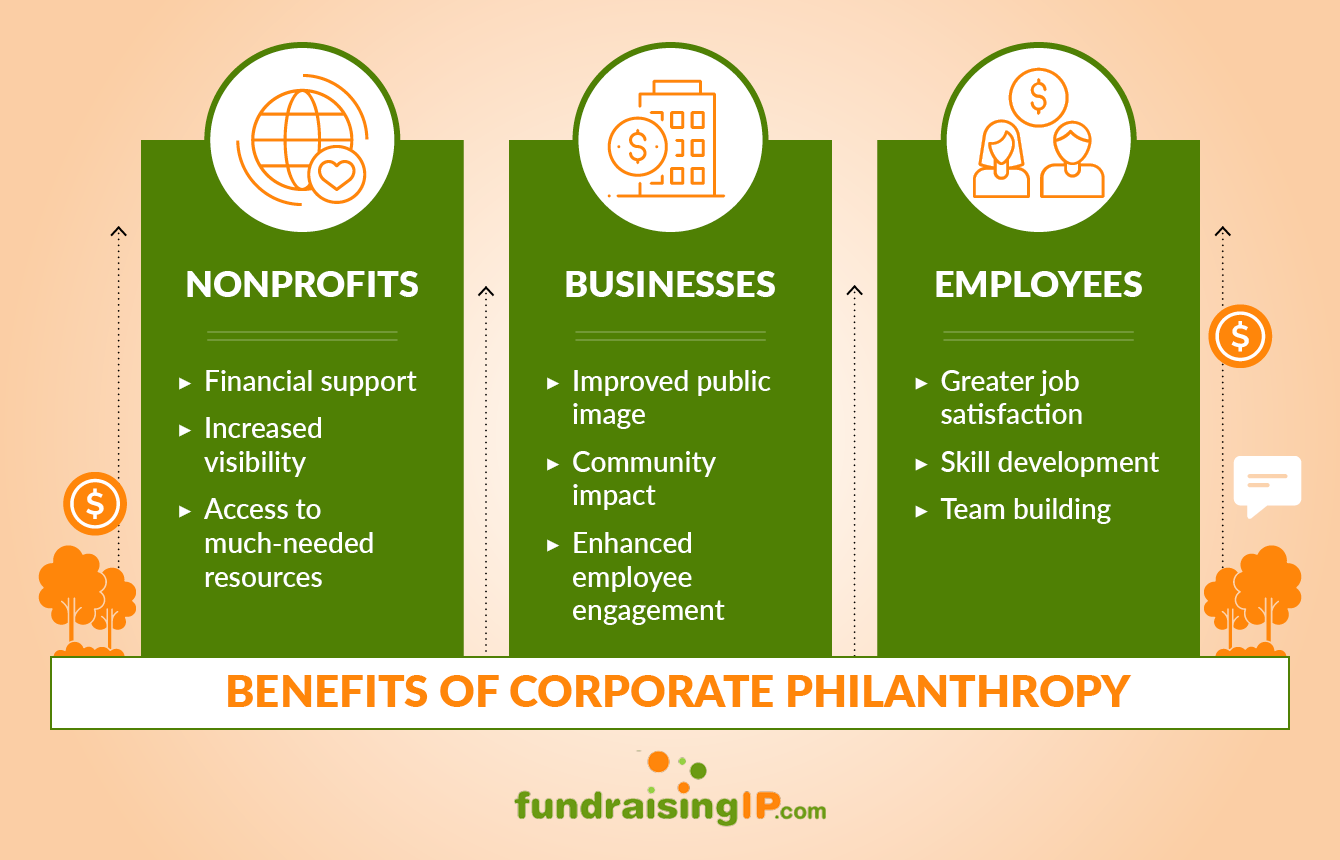Corporate philanthropy success stories: Why leaders like Coca-Cola give back
Why Corporate Philanthropy Issues: A Guide to Company Social Duty
Corporate philanthropy functions as an important component of corporate social responsibility. It reflects a firm's commitment to social concerns and enhances its public picture. Businesses participating in kind initiatives often see boosted employee morale and stronger community connections. The real effect of these campaigns can be multifaceted and complicated. Recognizing the nuances of business philanthropy can illuminate its value in today's organization landscape. What are the critical factors that drive its success?
The Meaning of Business Philanthropy
Business philanthropy refers to the charitable payments and initiatives taken on by organizations to sustain social reasons and community advancement. This concept includes a variety of tasks, consisting of financial contributions, employee volunteer programs, and in-kind gifts of services or products. Firms take part in philanthropy to address social issues such as education, healthcare, ecological sustainability, and poverty alleviation.
Generally, business philanthropy is structured via formal programs or collaborations with not-for-profit companies, allowing services to utilize their sources successfully. These initiatives typically aim to make a positive effect on the neighborhood while lining up with the firm's values and mission. Additionally, business philanthropy reflects a commitment to company social obligation, showcasing just how businesses can add to culture past profit generation. By taking part in philanthropic initiatives, firms can play a significant function in promoting social adjustment and dealing with neighborhood demands.
Advantages of Corporate Philanthropy for Services
Participating in company philanthropy offers countless benefits for services, improving their credibility and fostering more powerful neighborhood connections. Companies that proactively take part in philanthropic campaigns usually experience enhanced worker morale and loyalty. When workers view their organization as socially liable, they are most likely to feel honored of their office, resulting in greater degrees of task contentment and retention.
Furthermore, corporate philanthropy can create beneficial networking chances. Teaming up with non-profits and area organizations allows businesses to get in touch with similar people and groups, potentially causing collaborations that can benefit both parties. Furthermore, businesses took part in philanthropy may locate themselves a lot more attractive to stakeholders and financiers that prioritize moral methods.
Ultimately, company philanthropy not only sustains societal requirements but additionally offers substantial advantages to businesses, producing a win-win situation that advertises growth and sustainability while contributing favorably to the world.
Enhancing Brand Loyalty Via Social Responsibility
Enhancing brand commitment through social obligation entails building count on with consumers by straightening company actions with area worths (corporate philanthropy). Companies can cultivate deeper connections through community interaction campaigns that reverberate with their target market. In addition, genuine brand storytelling can additionally enhance loyalty by showcasing genuine dedication to social causes
Building Count On Through Activity
Structure count on through action is a powerful strategy that business can carry out to reinforce brand name loyalty and foster deeper links with consumers. When services actively take part in company philanthropy, they demonstrate a dedication to ethical methods and social responsibility. This positive method not just boosts their credibility however likewise reverberates with consumers that prioritize worths positioning. Openness in humanitarian efforts is crucial; companies need to effectively interact their initiatives and the impact they are making. Authenticity plays a significant duty also; customers are a lot more likely to support brands that really appreciate societal issues as opposed to those that engage in shallow advertising. Ultimately, by focusing on significant actions over simple words, companies can support long-lasting trust fund and loyalty amongst their client base.
Community Interaction Campaigns

Genuine Brand Narration
Area interaction initiatives often work as a foundation for authentic brand name storytelling, which plays a considerable duty in growing brand loyalty. By sharing real narratives about their social responsibility initiatives, business can attach psychologically with consumers. These stories highlight the brand's values, objective, and dedication to societal enhancement, promoting count on and relatability. They are much more most likely to establish a deeper fondness and preference for it when consumers perceive a brand name as socially liable - corporate philanthropy. Genuine storytelling also motivates openness, inviting customers to engage with the brand on a personal level. As an outcome, services not only enhance their reputation but likewise develop long-term partnerships with their audience, ultimately bring about raised commitment and advocacy in a competitive market
The Function of Workers in Corporate Philanthropy
Employees play an essential duty in forming a firm's humanitarian efforts with their interaction and participation. Efficient worker interaction approaches can boost volunteerism, causing meaningful community impact. As organizations harness the collective energy and passion of see this site their labor force, they can foster a culture of offering that prolongs past the office.
Staff Member Engagement Methods
Interaction in corporate philanthropy fosters a sense of function that extends beyond simple profit-making. Firms can enhance employee involvement by implementing different methods that encourage useful content involvement in philanthropic efforts. One efficient approach is to develop a coordinating gift program, where the firm matches worker contributions to eligible charities, amplifying their impact. In addition, normal interaction concerning philanthropic efforts can create awareness and inspire employees to add their time and sources. Supplying platforms for staff members to share their philanthropic rate of interests cultivates a feeling of possession and community. Recognizing and rewarding staff members for their humanitarian contributions can additionally strengthen a society of offering, inevitably leading to a much more engaged labor force lined up with the firm's social duty objectives.
Volunteerism and Neighborhood Impact
Company philanthropy grows when individuals proactively join volunteerism, directly affecting the communities they serve. Employee involvement in volunteer initiatives not only improves company culture however additionally promotes a feeling of purpose and connection amongst team. Via offering, workers establish vital skills, such as teamwork and leadership, which can equate into improved job performance. Furthermore, when workers unify for community causes, they enhance their bond with the company, boosting total spirits and commitment. Organizations that urge volunteerism frequently see a positive public picture, as area interaction reflects their dedication to social duty. Inevitably, the collective influence of employee volunteer initiatives can transform areas, addressing pressing social problems while strengthening company values and goal.

Determining the Influence of CSR Initiatives
As companies significantly buy corporate social responsibility (CSR) campaigns, understanding their effect comes to be important for evaluating effectiveness and directing future efforts. Measuring the impact of CSR requires a multifaceted strategy, including both quantitative and qualitative metrics. Key performance indications (KPIs) such as neighborhood interaction levels, staff member satisfaction, and ecological enhancements offer useful insights into the outcomes of CSR programs. Surveys and see this page meetings with stakeholders can disclose the social modification produced by these campaigns, while data analysis aids track progression against established objectives.
Moreover, lining up CSR goals with organization purposes improves accountability. Organizations can utilize structures such as the Global Coverage Initiative or the UN Sustainable Advancement Goals to standardize their dimension processes. Inevitably, accurate assessment of CSR initiatives not just demonstrates a business's commitment to social responsibility yet also educates approach modifications to make the most of positive influence, promoting a society of sustainability and neighborhood engagement.
Best Practices for Applying Efficient CSR Methods
Carrying out effective CSR approaches calls for a clear understanding of a company's goals and worths, assuring positioning with stakeholder expectations. Effective companies start by carrying out an extensive evaluation of their social, environmental, and financial effects, permitting them to recognize areas for enhancement. Stakeholder involvement is essential; companies should actively entail employees, consumers, and neighborhood participants in the development and execution of CSR campaigns.
Transparency is an additional best method, as it fosters trust and responsibility. Firms ought to communicate their CSR purposes and progression openly, sharing both challenges and successes. In addition, incorporating CSR into the core company approach boosts its effect, making it a basic part of operations instead of an afterthought. Routine evaluation and adaptation of CSR efforts, notified by stakeholder responses and transforming social requirements, guarantee significance and efficiency. By adhering to these methods, companies can produce lasting and significant CSR strategies that reverberate with their areas.
Regularly Asked Questions
Just How Can Local Business Join Corporate Philanthropy?
Little organizations can join business philanthropy by donating a percentage of revenues, sponsoring local occasions, partnering with nonprofits, supplying worker volunteer days, and taking part in neighborhood service tasks, fostering a favorable effect and boosting their brand name track record.
What Are Common Mistaken Beliefs About Company Philanthropy?
Common misconceptions concerning corporate philanthropy include the idea that it's solely an advertising device, that only big business can take part, which it lacks real effect. Many take too lightly the worth little businesses can contribute with purposeful engagement.
Exactly How Do Consumers Perceive Business Taken Part In Philanthropy?
Customers commonly view firms participated in philanthropy favorably, connecting such initiatives with business responsibility, honest actions, and area assistance. This assumption can improve brand loyalty, influence getting choices, and improve total corporate reputation in the market.
Are There Tax Advantages for Businesses Entailed in Philanthropy?
Organizations associated with philanthropy usually enjoy different tax obligation benefits, such as deductions for charitable payments. corporate philanthropy. These rewards can boost a company's financial standing while advertising a favorable public photo via their community engagement initiatives
Can Corporate Philanthropy Improve Employee Retention Fees?
Business philanthropy can boost worker retention prices by cultivating a feeling of function and belonging amongst staff. Involved staff members, straightened with firm values, are more probable to remain fully commited and completely satisfied within their duties.
Business philanthropy serves as a crucial part of business social duty. Company philanthropy refers to the philanthropic contributions and initiatives undertaken by services to support social reasons and neighborhood development. Furthermore, company philanthropy mirrors a commitment to company social responsibility, showcasing how businesses can contribute to culture past revenue generation. Involving in business philanthropy offers countless advantages for businesses, enhancing their credibility and fostering more powerful community connections. Customers frequently watch business involved in philanthropy positively, associating such initiatives with corporate obligation, ethical behavior, and area support.